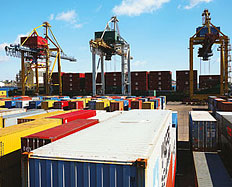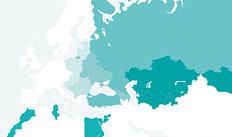Country Assessments
Bulgaria
HIGHLIGHTS OF THE PAST YEAR
- Growth remains limited but fiscal discipline has been strong. As a result of its strong fiscal performance, Bulgaria was removed from the European Commission’s excessive deficit procedure, but economic growth remains low in a difficult global environment.
- The energy sector has seen mixed reform signals. The government has responded to outside pressures by stepping up efforts to liberalise the electricity market, but revisions to the access charges for renewable generation may deter investment in the sector.
- Banking sector stability has been maintained notwithstanding the relatively high share of Greek banks. This has been achieved largely through strong local supervision.
KEY PRIORITIES FOR 2013
- Private sector involvement can be further enhanced in infrastructure. The remaining enterprises to be partly or fully privatised include some energy generation companies and all of the transmission system, transport operators and other municipal utilities, as well as bridges, ports and airports. There is room for further private sector participation in some large-scale construction projects in the transport and energy sectors.
- Developing a financially strong and well-regulated municipal sector is a key priority. The necessary steps include reducing the reliance on centrally-managed EU grants, strengthening municipalities’ ability to meet contractual obligations and to attract commercial financing, and boosting their capacity to absorb EU funds.
- Efforts to restructure companies’ balance sheets and shift to more productive, export-oriented activities should be stepped up. The government can also help by encouraging enterprises to improve the efficiency of energy usage.
MACROECONOMIC PERFORMANCE
The economic recovery is slowing down but the impact from the eurozone crisis has been managed relatively well. After virtually zero growth in 2010, the Bulgarian economy was recovering in the first half of 2011. However, in late 2011 and the first half of 2012, the recovery momentum began to slow down, as evidenced by several macroeconomic indicators. GDP grew by less than 1 per cent in the first two quarters of 2012. Export growth, which drove the recovery after the 2009 recession, has been weak or negative and, with consumer confidence feeble and credit growth limited, domestic demand remains subdued. There has also been a significant decline with regard to inflows of FDI. In 2008 FDI inflows accounted for about 19 per cent of GDP and in 2011 they fell to less than 3 per cent of GDP. Inflation remained below 2 per cent throughout the first half of 2012, but jumped to 2.4 per cent year-on-year in July on the back of a hike in electricity prices. Despite the slow-down, Bulgaria has been coping well with the crisis in the eurozone and is forecast to have the strongest GDP growth rate this year in the SEE region.
The government has maintained a prudent fiscal policy. The authorities tightened fiscal policy in 2011 and the general government deficit was kept below the targeted 2.5 per cent of GDP and firmly within the limit of 3 per cent as set by the European Union’s stability and growth pact. As part of the reform package, an increase in the retirement age – for men from 63 to 65 and for women from 60 to 63 – became effective on 1 January 2012. In light of Bulgaria’s recent strong fiscal performance and demonstrated history of fiscal prudence, the Council of the European Union decided in June 2012 to close its excessive deficit procedure for Bulgaria. The country also had a successful return to international debt markets in July 2012. In the first euro-denominated issue since 2002, Bulgaria sold €950 million of five-year Eurobonds at a yield of 4.25 per cent, which was viewed as highly favourable under existing market conditions. Continued fiscal consolidation is planned this year with the deficit targeted at 1.35 per cent of GDP. The authorities remain committed to the currency board but the government has recently indicated that entry into the ERM-II mechanism is not envisaged in the near future.
Weak growth is expected in the short term. Problems in the eurozone will continue to impact the economy in Bulgaria because of the close trade and investment links. Growth in 2012 is forecast to be a little above 1 per cent and only a mild recovery is expected in 2013. However, the economy’s medium-term growth potential remains good; GDP per capita (adjusted for purchasing power standards) is estimated by Eurostat to be less than half the EU average, therefore implying considerable scope for catch-up growth in the future.
MAJOR STRUCTURAL REFORM DEVELOPMENTS
Bulgaria continues to make progress in judicial reform and in fighting corruption and organised crime, but some concerns remain. In its annual report under the Cooperation and Verification Mechanism, published in July 2012, the European Commission (EC) noted that Bulgaria had come a long way since accession to the European Union in 2007. The report highlighted some recent reforms, including the establishment of an independent judicial inspectorate and specialised structures to pursue organised crime, and the improvement in asset forfeiture legislation. However, the report also noted the lack of direction in policy and the fact that questions remain about the direction of reform in these areas. The next assessment will be made at the end of 2013, but the EC will continue to monitor progress closely in the meantime.
Absorption of EU funds has accelerated in the past year. By the end of 2011 total financing paid by the European Union under the Structural and Cohesion Funds programme had reached nearly €1.26 billion (out of a total allocation for the period 2007-13 of €6.67 billion), compared with just €681 million a year earlier. By June 2012 absorption had risen further to €1.59 billion. The sharp rise reflects a concentrated effort by the authorities to implement projects, as well as enhanced support from several international financial institutions.
Productivity in agriculture has risen significantly. The progress has been particularly marked with regard to grain yields, which have increased substantially in recent years. Although the food industry overall is rather fragmented, the retail market is well organised in major cities with a number of large players present, and penetration in rural areas is increasing.
Changes to the energy law may boost competition, but concerns persist over delays in liberalisation and unexpected government intervention in the renewables market. In July 2012 parliament adopted a number of amendments to the energy law that are designed to boost competition in the market. Consumers should now be able to shop for an electricity provider, thereby giving an incentive to suppliers to compete for customers and increasing competition. However, these efforts come at a time of ongoing infringement proceedings. Recent cases have related to delays in implementing liberalisation measures and the continued use of regulated prices. In addition, concerns have been raised in recent months over the regulator’s recent introduction of grid access fees for renewable generation, which has negatively affected the investment climate.
The regulatory framework for telecommunications has been further improved. Efforts have been made in the past year to align the relevant legislation with EU requirements, although implementation in the area of tariff rebalancing has not yet been fully completed. The mobile segment of the market is particularly competitive and broadband penetration has grown substantially over the past few years.
Competition remains strong in the banking sector. There are 31 banks currently operating, and the top five banks account for just over half of total assets in the sector. The capital adequacy rate was 17.5 per cent as of end-2011 and deposits have been growing robustly in the past year at double-digit levels, allowing banks to reduce somewhat their reliance on parent funding. Although the banking sector as a whole has managed to cope well with domestic and global pressures, the level of non-performing loans (NPLs) has been rising, reaching 14.9 per cent as of end-2011 (compared with 11.9 per cent at end-2010). Regulatory measures have been stepped up to deal with the fallout from the eurozone – and particularly Greek – crisis given the high share of Greek subsidiaries in the banking sector.







